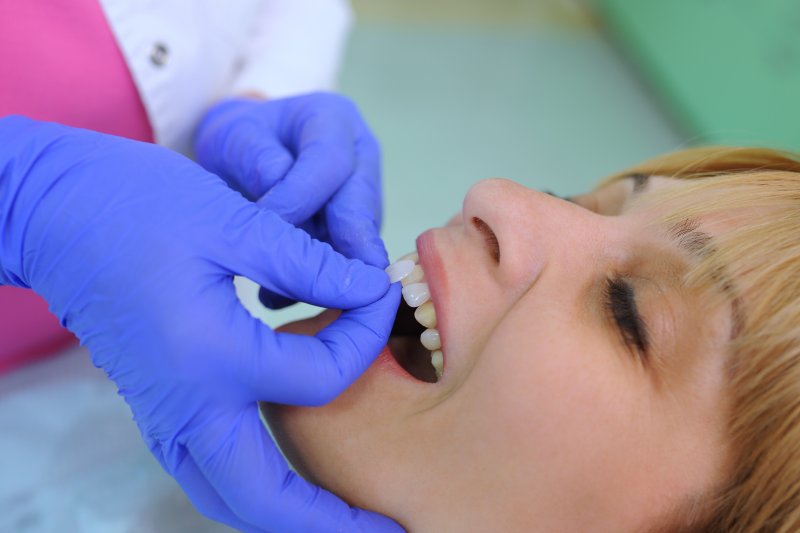
If you’ve ever wondered why so many of your favorite celebrities seem to have flawless smiles, it’s probably thanks to dental veneers. These thin porcelain sheaths are designed to fit over troubled teeth to cover up flaws like chips, cracks, gaps, and stains, allowing them to completely transform a smile into a beautiful new state. However, placing them requires a tiny amount of enamel to be removed from the treated teeth, making some people wonder if they will make their teeth sensitive. Here’s what you should know about the relationship between veneers and dental sensitivity.
What Will My Teeth Feel Like After Getting Veneers?
Many patients will experience some mild discomfort for a few days or weeks after receiving veneers, but this will fade over time if these sheaths are placed properly. Dental sensitivity after receiving veneers usually happens for one or both of two reasons:
Enamel Loss
When placing a veneer, a dentist will have to remove a small amount of enamel so the piece can fit properly over the tooth. This can cause some stress to the underlying nerve while also reducing the tooth’s natural insulation. As you get used to wearing veneers, this sensitivity should fade over time.
Improper Bite
Getting veneers can alter the alignment of your teeth, which takes a few days for most patients to get used to. While adjusting to your new bite, you may experience some irritation and increased sensitivity. This issue should diminish over time, but speak with your dentist if it seems excessive. They may be able to address the problem by making adjustments.
How Can I Keep My Teeth Comfortable After Receiving Veneers?
There are several ways to help reduce your temporary discomfort after getting veneers. These include:
- Using a desensitizing toothpaste, particularly after meals.
- Avoiding hard foods like hard candy, nuts, corn on the cob, and anything else that requires extra chewing force.
- Sticking to room-temperature liquids for a few days after receiving veneers.
- Avoiding sweet and spicy foods and beverages.
- Abstaining from chewing on found objects or grinding your teeth.
- Wearing a mouthguard to bed if you grind at night.
- Rinsing your mouth with warm saltwater a few times a day to treat discomfort and swelling.
- Taking over-the-counter pain medication such as ibuprofen.
Any discomfort you may notice after getting veneers should not last long. If you find that the problem is not getting better or is getting worse, contact your dentist for further information.
About the Practice
Hiner Family Dentistry delivers the finest dental health services available in Houston, TX. Led by the husband-and-wife team of Drs. Reagan and Matthew Hiner, the staff ensures that each patient receives personalized and courteous care in a friendly office environment. Areas of expertise include general, restorative, emergency, and cosmetic dentistry such as veneers. To schedule a consultation for veneers, contact the office online or dial (713) 589-5539.
